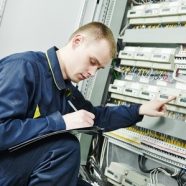
In the U.S. becoming a commercial electrical contractor is a multi-step process that requires study, practical experience, and various licensing exams. That’s a good thing too, because contractors literally work with something (electricity) that has the power of life and death. No one would let an unqualified surgeon perform surgery, and the same goes for our homes. Throughout the U.S. we’re choosy about who we allow to work with electrical power, and that’s a very good thing.
Various Types of License
Many people don’t realize that there is more than one kind of license for electrical contractors in Florida. These include:
- Electrical Contractor (Certified or Registered)
- Alarm Contractor I (Certified or Registered)
- Alarm Contractor II (Certified or Registered)
- Electrical Specialty Contractor (Certified or Registered)
Among the specialties that contractors can choose to be licensed for are:
- Residential Electrical Specialty
- Utility Line Specialty
- Lighting Maintenance Specialty
- Sign Specialty
- Limited Energy Specialty
Each of these types of license has slightly different requirements, and just because a contractor is licensed in one area, that does not mean that they can work in all areas of electrical installation, maintenance or repairs.
General Requirements for Licensing
Even though there are slightly different requirements for the different types of contractor licenses in Florida, there are a few basic criteria that each contractor will need to fulfill, regardless of their area of expertise and focus. These include:
- They must meet the minimum study requirements for licensing.
- They must meet the minimum experience requirements for the type of licensing they are seeking.
- They must pass the relevant exams, which may include industry specific exams as well as exams about business practices and other topics.
- They must maintain the minimum contractor’s insurance for their area of specialty at all times.
- Contractors will often undergo credit checks, and they will be required to meet minimum continuing education requirements.
As you can see, there’s a lot that goes into becoming an electrical contractor in Florida, whether you specialize in residential installations, commercial electrical, electrical maintenance or any other field.
As a company, like most professional electrical contractors in the State of Florida, we’re glad that these regulations are in place, because they help to ensure that customers who use licensed contractors can expect to get the appropriate electrical protection in West Palm Beach that we would want in our own homes.
When you work with a licensed electrical contractor, you can be sure that they know the business, that they have experience in the field, and that they have the documentation necessary to certify your installation, and the insurance to protect you if something goes wrong.
Always Choose a Licensed Contractor
Licensed electrical contractors have to go through a long process and jump through many hoops to get and stay licensed. That usually reflects in the rates they charge, although there are many out there that offer reasonably priced service and great value for money.
If there’s one piece of advice we can offer any potential customer, however, it is to always choose a licensed contractor. Even if someone who is not licensed offers to do a job for you at a great price, and you’re tempted, remember that unlicensed contractors cannot perform legal electrical installations, repairs or maintenance. More importantly, if you don’t use a licensed contractor, and a failure in their installation or electrical protection measures results in a fire or any other damage, you might not be covered by your insurance policies.
Just save yourself the trouble, and hire a professional. They’ll get the job done right, and you’ll have peace of mind.

Recent Comments